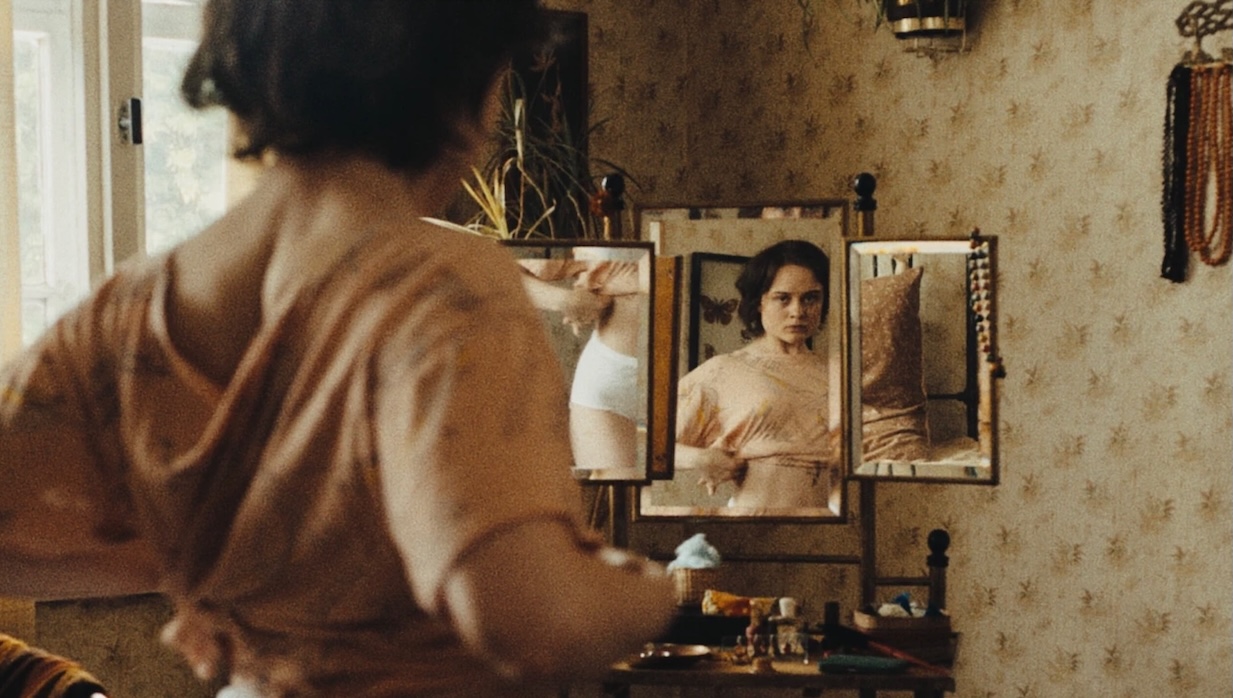 Back to selection
Back to selection
Cannes 2025: Sound of Falling, Two Prosecutors
 Lena Urzendowsky in Sound of Falling
Lena Urzendowsky in Sound of Falling It’s always a dangerous business when entertainment journalists and film critics feel the need to wade into political commentary, but the Trumpian shadow hovering over everything makes people feel like they have to say something even if they don’t want to. At The Hollywood Reporter, a headline captures the exasperated tone: “Cannes Dealmakers Are Already Sick of Talking About Trump’s Tariffs.” Everyone would prefer to gossip and go about their usual routines even as the theoretically imminent global recession seems to already be in effect. Purely based on visual tells—crowd sizes, the increased number of party invites I’ve gotten—attendance is down, yet tickets are harder to come by than ever, underlining a secondary theme of “artificial scarcity.”
Darkness hovers over the appropriately grim first competition title to screen, Mascha Schilinski’s Sound of Falling, a 150-minute sophomore feature and declaration of “I don’t care what the audience wants” artistic intent circling around a broad assortment of sexual misdeeds and assaults, leading to both literal inherited family trauma and—pretty explicitly while putatively metaphorically—its broader German historical equivalent. In non-linear order, Falling presents the stories of four generations of women living in the same East German house, all of whom just can’t stop killing themselves as the 20th century marches into the 21st; their suicides are nearly as plentiful as the copious digital grain larding the frame. This is a firmly of-the-moment looking movie, all digital smear compounded by fake grain, occasionally shot with the currently ubiquitous lenses which fall off around the edge.
Falling establishes its methods right from the get-go, as a young girl who’s tied her leg to her thigh is repeatedly called by her father to come feed the pigs. But first she goes and looks at the bed where the family’s actual amputee lies; by the time she’s gotten downstairs, she’s taken so long that dad slaps her. Unexpectedly, this prompts her to look back at the window and smile in POV complicity with the disabled man, thereby establishing the movie’s default trajectory, in which a desire for mystery is always outpaced by a race towards misery; this latter instinct is always going to be evident when you steal the final scene of Mouchette, though I got the idea long before then. There’s a definite intent to keep audiences unmoored, as in the film’s most-often-deployed sound, a vinyl-record click building to a white noise hiss, an anti-literal-minded device that quickly loses its effectiveness well before being deployed for the 20th time. Even as chronology and cause-and-effect remain purposefully muddled, dialogue helpfully nudges us in the right direction (“Funny how something can hurt that’s no longer there”—amputation! trauma!). I can’t improve on Jordan Mintzer’s description of the film as Tree of Life “by way of Jane Campion and Michael Haneke”—he means that positively, but that’s exactly why I disliked the movie, which also throws in a little levitation at the end as a Tarkovsky Hail Mary. They are no longer falling; they are rising.
Sergei Loznitsa has never had any trouble making his movies explicit about what they mean, and Two Prosecutors seems designed to function primarily as a reminder that Stalinism was bad. 1937: three months into his job, young prosecutor Kornyev (Alaksandr Kuznetsov) arrives at a massive prison to interview a prisoner who’s somehow gotten a letter mailed to his office. Kornyev is greeted by various forms of rudeness which don’t bother to masquerade as politeness, and a vast portion of the film’s first part consists at him being glared at by a remarkable collection of gargoyle-adjacent guards, a gallery of nightmarishly unpleasant faces that are inevitably pretty funny in their grotesquerie and hostility. (Coincidence or not, one of the main antagonists in this section is a prison governor played by Vytautas Kaniusonis, who bears a strong resemblance to filmmaker and Putin stooge Nikita Mikhalkov. My money’s on intentionality.) That Kornyev manages to actually interview Stepniak (Aleksandr Filippenko), the inmate who wrote in his own blood to protest against his beating by NKVD operatives, is a pyrrhic triumph; it’s very clear from the beginning that this can only end badly for both prosecutor and prisoner.
The plot is symmetrical: in Prosecutors‘ first part, Kornyev navigates a number of antechambers to arrive at Stepniak’s cell, followed by a train journey to St. Petersburg where he repeats the room-to-room odyssey to obtain his second interview with prosecutor number two, then a train trip back, leading to the jail where this all started. All of this is lowkey funny, assuming you’re amused by Soviet men glaring at each other with unmitigated contempt and the general comedy of bureaucracy, and I snickered throughout even as people couldn’t stop checking their phones to see what time it was. Loznitsa’s eye remains immaculate; where his nonfiction films are dazzling in their elaborate compositions, ordering the world into something manageable, here he’s shooting on Lithuanian soundstages and counterintuitively more visually modest while constructing a world from the bottom-up. The prison itself is Lynchian, with offices in oppressive lime-green shades as blatantly artificial as Lost Highway’s central apartment, hallway passages streaked with blood-red floors and a whooshing sound that keeps rising in the room tone-mix. All this is impressive, and despite the ostensible stringency the film fairly raced along. My only real question is, what’s the point? Surely festival audiences don’t need a history lesson about the dangers of Stalinism, while viewers who do are unlikely to watch the latest fiction film by Sergei Loznitsa. My conclusion is that since it’s 2025 and historical memory of the 20th century can no longer be taken for granted, the earnestness of didactic intent is the primary and not-entirely-unjustifiable driver.
